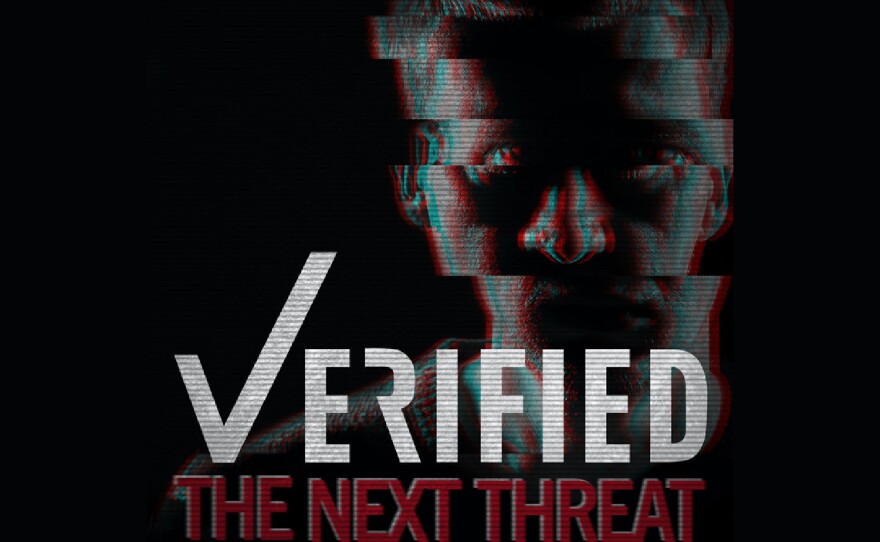Verified: The Next Threat uncovers an international network of global extremists who are recruiting for a new transnational holy war and white power.
Mark Greenblatt is an investigative reporter for the Scripps News Bureau. Whittney Evans spoke to Greenblatt about how this project began and how Russia’s war on Ukraine may be reinvigorating extremist groups.
Below is a transcription of an extended version of their conversation. It’s been edited for clarity.
MARK GREENBLATT: We really got started looking at this on the day of January 6th, when I spotted in the crowd, not only extremists, but a subset of extremists, the true blooded Nazi types that were wearing shirts, things like glorifying Auschwitz, and people carrying swastika flags. And I wanted to just know what was really happening here? How did these kinds of people get inside the United States Capitol? And so thus began a journey of really unpacking and discovering it’s not just the local corner store, Nazi white supremacist types that are out there, they actually have global connections.
WHITTNEY EVANS: How do you navigate exploring their processes and their goals without giving them a platform?
GREENBLATT: We had a lot of conversation about this. And the answer, inevitably, is that there's two different kinds of reporting on white supremacists: one is that you would simply amplify their message. If they go into the middle of town and say something vile and hateful, and you're there with a recorder and then you broadcast that out, you're simply giving a megaphone, in that case, to white nationalists and white supremacist. What we're doing is serious investigative reporting, that is not only understanding what truly are new movements that are forming right now, these are things that even top federal officials that we encountered in this podcast did not know about. We’re revealing real networks that are forming right now. This is really shedding a new light on a new chapter of white supremacy; a globally connected networked chapter that is a rising threat to the United States.
EVANS: So what are some of the global connections between white supremacist groups that you've been able to piece together throughout your reporting,
GREENBLATT: We ended up speaking to a designated terrorist in Russia by the name of Stanislav Vorobyev. He's the leader of a terrorist organization called the Russian Imperial Movement. And it was just shortly after, in fact, what happened in Charlottesville, that this organization in Russia made connections with an American white supremacist, named Matthew heimbach, who was a key promoter of the Charlottesville rally. And this organization has launched what is called ‘The Last Crusade’. They call it this. And it is a movement that is attempting to unite the world's white nationalists to come together and to help foment a new rise of, in particular, Christian white nationalism.
EVANS: In the podcast, you speak to top counterterrorism officials, one of whom is Irfan Saeed, about how serious these threats of racially motivated extremism are right now:
SAEED: “From the State Department's perspective, we're at the water's edge, out. And so for us, we're looking at how racially and ethnically motivated violent extremists are metastasizing around the world. And we are definitely seeing an absolute uptick on that.”
GREENBLATT: So this is the first time that the counterterrorism bureau of the State Department has ever given an interview to a podcast. And it was one of the first times that they've ever given a recorded interview to a reporter at their headquarters in the last few years. And effectively, what it comes down to is that the State Department has its eye on foreign rising threats all around the world. And their job is to actually designate the top threats as terrorist organizations taking their money away, taking their ability to travel away, and stopping their ability, or at least curbing their ability to attack the United States. So we brought all of what we had found to the State Department. And they talk in detail in our final episode about how difficult it is for them to actually combat this threat and to stop them. Because until they pick up a gun or actually pick up a bomb, the way the laws are written in the United States, the Federal Government can't actually designate these organizations.
EVANS: You mentioned Russian ties to U.S. white nationalists, has extremist activity changed at all as a result of Russia’s war on Ukraine.
GREENBLATT: After the invasion after Russia invaded Ukraine, there has been a real uptick in chatter among white supremacist among the ultra far right. And what's essentially happened is that white supremacists, white nationalists, have split into camps, either pro Russia or pro Ukraine. And they've very much radicalized because these emotions are running very high right now. And so they're very, very, pro Russia, or they're very, very pro Ukraine. Some are actually picking up guns and going and fighting on one side or another. And so what experts that we talked to are worried about is that the emotions that are running high throughout much of the world that we hear about, broadcast on television every night, they're also running high in these darker corners of the far right and that those emotions are also running high here in America and that the threat level might actually be even higher as as the conflict plays out in Europe.
EVANS: That's Mark Greenblatt, he's an investigative reporter for the Scripps news bureau, and a new podcast called Verified: The Next Threat. Thanks so much, Mark.
GREENBLATT: Alright, thanks so much, Whittney.



